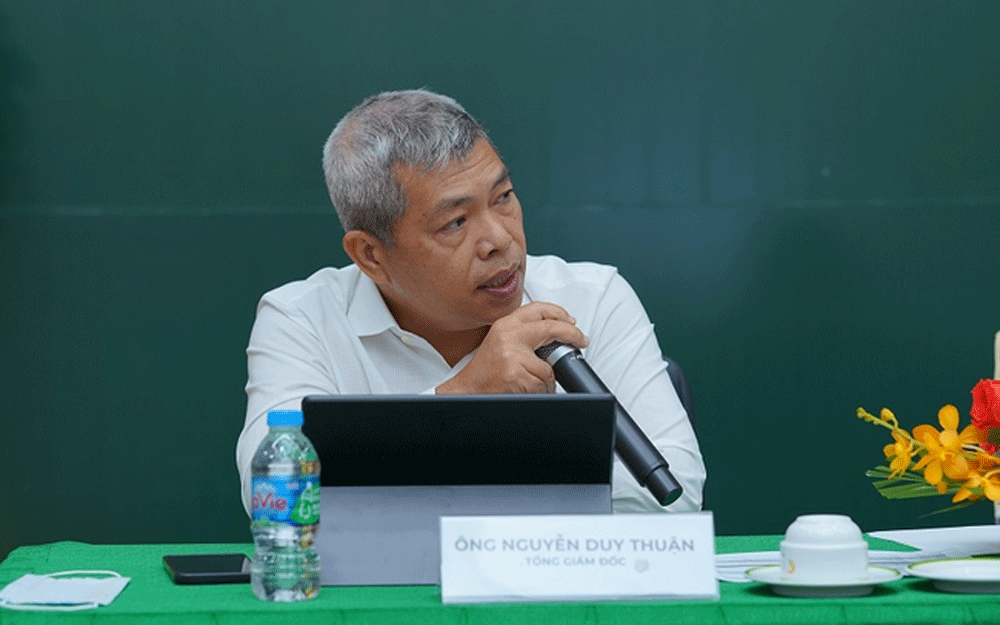Loc Troi Group, once a leading name in agriculture with a reputation for robust profitability, is now grappling with steep losses and allegations of financial misconduct. The company, renowned for being a "cash-printing machine" for over 30 years, has recently found itself mired in debt and scandals, including a substantial debt owed to farmers.
The company has accused former CEO Nguyen Duy Thuan - who held leadership from May 2020 until his dismissal on July 15 - of engaging in fraudulent activities and breaching legal regulations, resulting in significant financial losses. Loc Troi has requested legal authorities to take preventive measures against Thuan.
Speaking to the press, Chairman Huynh Van Thon (born in 1958) acknowledged the company’s missteps in leadership selection. He stated, “We were engaged in a battle where an insider infiltrated deep within.”
Nguyen Duy Thuan has yet to publicly respond, maintaining that "time will reveal the truth."
What went wrong at Loc Troi?

Loc Troi, originally established in 1993 as An Giang Plant Protection JSC, started out with a focus on providing plant protection products. In 2004, the company was privatized and continued under the same name.
Initially, plant protection products were Loc Troi’s main profit driver, contributing nearly all of its earnings before 2011 and remaining a major revenue source through its partnership with Syngenta, one of the world's top four agrochemical companies, from 2010 to 2021.
With profit margins as high as 30% from its plant protection business, Loc Troi accumulated substantial profits and enjoyed steady cash flow for many years.
Shifts and missteps
The company began its shift into the rice business in 2011, initially generating modest revenues. However, by 2015, rice sales surged to nearly 2.915 trillion VND, representing 36.3% of the company’s total revenue of nearly 8.027 trillion VND.
Meanwhile, revenues from plant protection products fell from 5.347 trillion VND in 2014 to 4.170 trillion VND in 2015, reducing its share of total revenue from 59.5% to less than 52%.
Despite this shift, Loc Troi still benefited from high profits due to its continued partnership with Syngenta. However, the real turning point came in 2021, when Loc Troi parted ways with Syngenta. This marked the beginning of the company’s profit decline, with multiple quarterly losses reported in 2023 and 2024. The company also faced accusations of owing hundreds of billions of VND to farmers in An Giang and other provinces in the Mekong Delta.
During Nguyen Duy Thuan’s tenure as CEO, Loc Troi expanded rapidly, increasing its revenue, assets, and debts. In 2023, the company’s rice sales skyrocketed from 6.431 trillion VND in 2022 to 11.323 trillion VND in 2023. However, plant protection product sales declined from 4.403 trillion VND to 4.219 trillion VND, dropping from over 37% to 25.5% of total revenue.
Additionally, despite Loc Troi's heavy borrowing and the volatility in rice prices and exchange rates, the company made significant financial investments. Its 2021 audited financial report showed a 100 billion VND investment entrusted to VinaCapital Fund Management JSC for 24 months and holdings of 12 billion VND in bonds from Viet Capital Commercial Joint Stock Bank (Viet Capital Bank) with an interest rate of 8.5% per annum. By the end of 2021, Loc Troi also held 105 billion VND in bonds from Ho Chi Minh City Development Joint Stock Bank (HDBank).
A risky gamble on rice
Loc Troi ventured into the rice business following the global rice price surge in 2008. Its strategy aimed to complete a closed supply chain, offering seeds, agricultural materials, and technical support, followed by rice processing and export.
However, the company's intense focus on rice in recent years has led to mixed results. While its revenue doubled from 2020 to 2023, its gross profit margins dropped from over 20% in previous decades to just around 15%. Interest expenses also soared, compounding financial challenges.
At its 2024 shareholders meeting, Loc Troi proposed raising additional capital, but several high-risk proposals were rejected.
Although the company’s rice business grew, its plant protection product sales—the company’s former "cash-printing machine"—declined, dragging down overall profits.
When rumors surfaced in late 2021 about Syngenta ending its partnership with Loc Troi, the company's stock plummeted. At that time, CEO Nguyen Duy Thuan downplayed the situation, claiming that the company’s main revenue came from the rice business, with plant protection products being secondary. The 2021 financial report reflected this shift.
Syngenta's sales accounted for 30% of Loc Troi’s plant protection product revenue, roughly 10% of the company’s total annual revenue. However, Loc Troi had been repositioning itself as a service provider in the broader agricultural sector.
Despite this, rice has proven to be a low-margin, high-risk industry. Loc Troi reported losses in the first quarter of 2024, citing high borrowing costs, currency fluctuations, and the need to pay farmers in advance at 0% interest while borrowing at high interest rates from banks.
The 2023 rice price surge did not mirror the 2008 crisis, and Loc Troi found itself in a difficult position. Domestic rice prices soared, while export orders signed earlier at lower prices created significant losses. Early 2024 saw Vietnamese rice export prices drop sharply.
Meanwhile, Loc Troi’s main competitor, Vietnam Fumigation JSC (VFG), which is part of PAN Group and backed by financial tycoon Nguyen Duy Hung (SSI), increased its focus on plant protection products. After Syngenta ceased its partnership with Loc Troi, it became a strategic investor in VFG in January 2022, bolstering VFG’s growth.
Despite VFG's smaller asset base (2.945 trillion VND), the company reported revenue of over 3.557 trillion VND in 2023, up from 3.251 trillion VND in 2022, with profits reaching nearly 296 billion VND. VFG continued its upward trend in the first half of 2024, with revenue exceeding 2 trillion VND and profits of more than 160 billion VND.
In contrast, Loc Troi reported heavy losses in the first quarter of 2024, with no financial report available yet for the second quarter.
Manh Ha